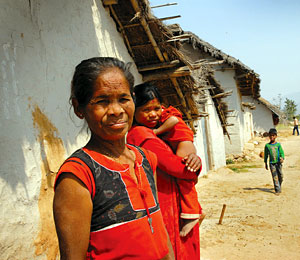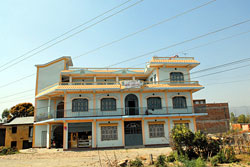 ALL PICS: KONG YEN LIN |
"It's the only way I can afford education for my children," says the economics professor at Mahendra Multiple Campus. The property he inherited from his father is now worth ten times more than its value five years ago.
Indeed, the only peace dividend that Dang has got with the end of the war is the surge in property prices. There is no investment, hardly any presence of the state, and seven months after the Maoists came to power no tangible improvement in delivery of services.
Highways here were closed for two weeks during the Tharu protests last month and there are blockades every other day. Inequality is on the rise as speculators and businessmen monopolise benefits from the post-war economy.
With land at a premium, property that the Maoists seized are not just not being returned, new land is being seized in the name of the internally displaced or freed Kamaiyas. Along the highway from Ghorahi to Tulsipur, there is almost no portion that don't have huts of 'sukumbasi' squatters.
There is no visible effort to develop housing and sanitation facilities for the new settlements. "We were issued red cards three years ago to sit in our boxes, nothing more than that," says Khitini Chaudhari who lives in the squatter settlement. Alienation is also deepening among the indigenous Tharu community of Dang. "The war might have been over and there is no fighting, but we're still not being treated as Nepali citizens," says a local Chandrakala Chaudhari (pictured).
 HAVES AND NOT HAVES: With land prices soaring after the end of the war, Dang residents are investing heavily in property along the highway. But the poor still live in their mud huts.  |
The new settlements and buildings are haphazard and do not follow any zoning rules. Local officials all say what should be, but seem powerless to control what is happening.
"All construction activities should have official approval to make sure that land use is strictly classified and regulated," says local development officer Madhu Sudan Poudyal.
Ethnic friction is mounting, and climaxed in the Tharu protests in which two were killed in Dang. "The war ended but there is no peace," says population studies teacher Sudharshan Rijal, "the people are still waiting for peace and justice."
But for those who've lost loved ones during the conflict, it has been one endless struggle to survive. Six years ago Bahuni Chaudhari's husband was killed in a crossfire while harvesting rice in fields. The 35-year-old has brought up two young children on her own, toiling in the farm and doing odd jobs.
"I'm living only for my children and working hard to give them a better education and future," says Bahuni, " I have no more fear because I have suffered so much."
Says Ghorahi English teacher Ram Hari Rijal: "People are starting to recognise the importance of education, the presence of girls in the classroom is also increasing."


